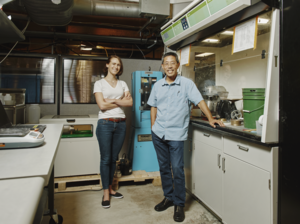Tech nerds and common consumers alike are often captivated by the latest nifty gadget or amazing app coming out. That same enthusiasm, however, isn’t normally shared for less glamorous startups doing necessary, but otherwise boring work.
Just look at Essmart, a distribution startup getting life-improving products to rural portions of the world. Although their company is doing meaningful work by helping villages in India have access to items like water filters and agriculture tools, it is not grabbing the attention of many investment firms. And who could really blame VCs when they’re chasing startups with jaw-dropping products that look like they’re out of a Sci-Fi film?
Obviously, this leaves what some would consider Plain Jane ventures like Essmart in a compromising situation of not knowing where their next funding check is coming from - or if it’s coming at all.
"We were inspired by Airbnb’s Obama O’s, which they produced to gain traction and fundraise for the startup during its early stages.”
That’s why Essmart - which was launched by MIT, Harvard, Northeastern and Tufts alumni - has taken matters into its own, very unconventional hands. Last week, the startup launched a Kickstarter campaign, through which it’s selling plush toys made to look like different types of Indian food.
Huh?
Yep, it’s pretty ridiculous, especially after you see these goofy cuisine characters called Happy Bellies. But Essmart admits how ludicrous this funding effort is. In fact, the company is hoping this is so strange and off-beat that as a distribution venture it’ll somehow work out.
Diana Jue Rajasingh, Co-Founder and COO of Essmart, explained that the weird idea came about when one of her friends was visiting her in India. After encountering a lot of new delicacies, her friend looked at a pile of idlis - a rice and lentil cake that’s eaten for breakfast - and exclaimed that they looked like pillows. In that moment, the Essmart exec realized that a lot of different Indian foods were kind of cute.
A year later, the company was brainstorming ways to finance its growing operations further. The team had gone all of the traditional funding routes. They wanted to try something new and completely out of their normal scope.
"Essmart has been fortunate to receive grant funding and the support of angel investors, and we’ve bootstrapped and survived off of this and our revenue from wholesaling life-improving technologies and market testing for late-stage prototypes,” explained Jue Rajasingh. "Now, we’re supplementing our funds with crazy creative ideas like Happy Bellies.”
So they went for it. They picked a variety of foods from all over India and made them into stuffed animals. Apparently, each one of has a distinct personality, according to Jue Rajasingh.
"We were inspired by Airbnb’s Obama O’s, which they produced to gain traction and fundraise for the startup during its early stages,” Jue Rajasingh told me. "Why can’t we do the same with these plush toys shaped like Indian foods? They’re also ridiculous, but there might be interest.”
Why are they going goofy for funding?
In many ways, this source of funding is laughable. A share of people - myself included - may not really get it and view a funding campaign this ridiculous as a form of desperation. Maybe some people will bite and help Essmart raise the $60K they’re looking for. No matter your opinion on this creative financing strategy, it could be pointing to a serious problem in the startup community.
"One of our obstacles to growth is funding,” Jue Rajasingh said. “Last-mile distribution is still an under-recognized and under-funded problem in international development. It’s not as sexy as a new product or technology. Traditional funding sources for social enterprises have categorical mandates that do not include distribution. Working capital for early-stage distribution companies is nearly non-existent, or it’s only available at incredibly high interest rates or for later-stage companies.”
Who knows: If less flashy ventures don’t find the funding they need to get and stay off the ground, we may be seeing more ridiculous efforts. So what’s next?
Images provided.








